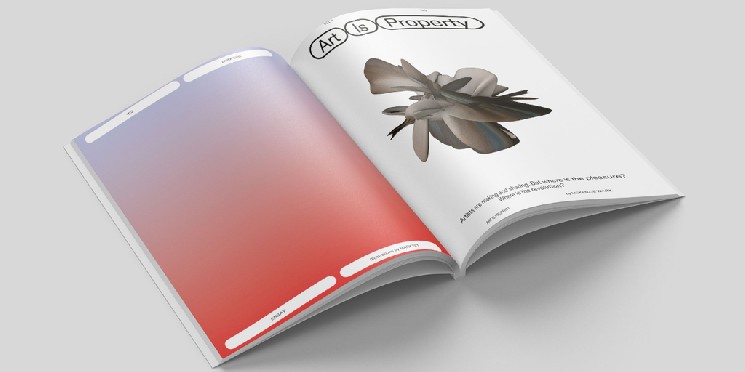Print Is Dead? Why NFT Platform Zora Is Launching a Magazine

Zine, the digital culture magazine from NFT minting platform Zora, is going where few Web3 media offerings have gone before: back to the physical realm.
Today, Zora Zine will publish its first-ever print edition—though getting hands on a copy won’t be quite as simple as heading to your nearest newsstand or grocery store checkout aisle.
A total of 2,500 collectible Ethereum NFTs representing copies of Zora Zine Print Issue 001 are on sale now; those NFTs can then be redeemed by holders to acquire a physical magazine. Public sale price for the NFTs is .0777 ETH, or just over $150.
Why would a magazine dedicated to chronicling the builders of the decentralized internet, published by a company “on a mission to bring creativity on-chain,” move not just off-chain but also offline?
Zora Zine Print Issue 001—Fake Ads
22 artists created fictitious advertisements for a nonexistent Web3 service and/or product.
04.20. pic.twitter.com/jepNRQj0MP
— Zora Zine (@____zine____) April 18, 2023
To Zora Zine’s Head of Editorial, Yana Sosnovskaya, Web3 is more a set of values and objectives than purely a technology stack. And print is one tool that can help advance those goals.
“Success isn’t just about the medium—it’s about creating value for users, in our case cultural and curatorial,” Sosnovskaya told Decrypt. “It is refreshing to have a tangible, collectable object that you can revisit at any time.”
Artist Royalties Are Among ‘Most Compelling Features of Crypto’: Zora Co-Founder
“We aimed to capture the zeitgeist of Web3 that we think will be fascinating to revisit as time goes on, players rotate, rules change, ideas swirl, and waves of hype come and go,” she added.
Like Zora Zine’s digital editions, Print Issue 001 will continue to experiment with blockchain-based solutions designed to decentralize and democratize the media industry. The issue, for example, will feature a project titled “Fake Ads,” for which 22 artists have created print advertisements for fictitious Web3 products and services.
Each of those artists, in addition to receiving an honorary fee, will be able to participate in a revenue split from an on-chain, open edition of the artwork that will be published online.
In that sense, the Web3 ethos of Zora Zine will live on in tandem with its print incarnations. Zine has previously experimented with using blockchain tools to give journalists, artists, and photographers cuts of the magazine’s revenue, to crowdfund writing, and to give audiences a say in what stories they’d like to see published.
Today is the last day to preview Zora Zine Print Issue 001 at Dunkunsthalle in NYC.
Shoutout @rhizome
Shoutout @ourZORA64 Fulton St
12-6 pm pic.twitter.com/a94IZ5ayUK— Zora Zine (@____zine____) April 15, 2023
The first print edition of Zine, which runs 250 pages, will focus on the theme of “Intergenerational Dynamics.”
Framing the early, bull run incarnation of Web3 as a rebellious teenager critical of its parents (Web2) and nostalgic for the idyllic world of its grandparents (Web1), the issue will examine what it will mean for Web3 to grow up and move past its idealistic youth into a more mature and nuanced framework and mentality.
The issue features works from over 60 contributors, including Wired founding executive editor Kevin Kelly, computer philosopher and futurist Jaron Lanier, composer Holly Herndon, art curator Hans Ulrich Obrist, generative artist Tyler Hobbs, and the late Herbert W. Franke, one of the world’s first computer artists. The physical issue will also feature special inserts and an as-yet-unrevealed piece of “custom hardware.”






 Bitcoin
Bitcoin  Ethereum
Ethereum  Tether
Tether  USDC
USDC  TRON
TRON  Dogecoin
Dogecoin  Cardano
Cardano  Bitcoin Cash
Bitcoin Cash  Chainlink
Chainlink  LEO Token
LEO Token  Monero
Monero  Stellar
Stellar  Zcash
Zcash  Litecoin
Litecoin  Hedera
Hedera  Dai
Dai  Cronos
Cronos  Tether Gold
Tether Gold  OKB
OKB  Ethereum Classic
Ethereum Classic  KuCoin
KuCoin  Cosmos Hub
Cosmos Hub  Gate
Gate  Algorand
Algorand  VeChain
VeChain  Stacks
Stacks  Tezos
Tezos  TrueUSD
TrueUSD  Dash
Dash  IOTA
IOTA  Basic Attention
Basic Attention  Theta Network
Theta Network  Decred
Decred  NEO
NEO  Synthetix
Synthetix  Qtum
Qtum  Ravencoin
Ravencoin  0x Protocol
0x Protocol  DigiByte
DigiByte  Zilliqa
Zilliqa  Nano
Nano  Siacoin
Siacoin  Numeraire
Numeraire  Waves
Waves  Status
Status  Ontology
Ontology  Enjin Coin
Enjin Coin  Hive
Hive  BUSD
BUSD  Pax Dollar
Pax Dollar  Lisk
Lisk  Steem
Steem  Huobi
Huobi  OMG Network
OMG Network  NEM
NEM  Bitcoin Gold
Bitcoin Gold  Augur
Augur  Bitcoin Diamond
Bitcoin Diamond